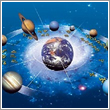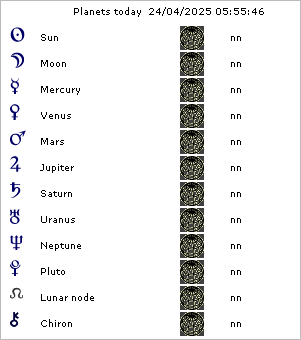Chronus Saturn
Edited by Daniela Grazioli
Chronus-Saturn is the time and form we still find today in many words of our language, like chronicle, chronic invalid, chronometry and many other words, that if we were putting them all together and let our mind wander freely , would go behind other things, so for example the chronicle would carry out facts that follow each other in a practical way, the chronic term might evoke the inexorability of time that passes and that in its imperceptible pile up, instant after instant, becomes more and more rigid and hard, and the action of measuring and of ordering. The time contained in these words and in others with the code “time“, is the image of a slow, long time, which always runs equally, without great speed or sudden dashes of the memories that forth or future dreams that dilate; it is an impassable wall within whose borders we build our lives in a practical way day after day, experience after experience, until the implacable ticking of time is stopped.
I have dwelt on these words that have to do with the time of Saturn, because it seemed to me a good way to introduce you into the atmosphere of time - Saturn, to have to get into contact, each through the own imagination and experience, with this god - planet, the lord of time. The Saturn symbol naturally does not only relate to time, but “it leads-together” inside many other things that returns to, still from the substance of which Saturn time is made of which we all have experience and know what it is, therefore in going through this train of thought I will explain other Saturn meanings.
The Saturn time is the time of the world governed by the principle of reality, and in reality it has limits and hardness, it is the time of delay and frustration, of waiting, and it toils to attain its goals, the acceptance of our own limits and of those that regard environment. Saturn does not give anything; each victory, each conquest is the result of careful and hard work of construction, which while he builds eliminates all useless extras, leaving only the structure, within which things have their own place and order. So in the body, Saturn, is the skeleton, the form needs to be finished, it is the spinal column whose rigidity and solidity allows us to be erect and to conquer an elevated vision, but that immobilizes us when it becomes too rigid or too fragile, and does not maintain the right elasticity.
Also, psychologically the function of Saturn works slowly; the personality of Saturn is tied to the instance of the super-I, the whole rules, regulations, values, and prohibitions that, day after day, we absorb from the environment, especially through our relationship with our parents when we are children and following through the contact with other figures and environments that are fundamental to us. Drop by drop, this complex system of “rules“ that do not contain only rules and prohibitions, but also suffering from approval and recognition, and disapproval and condemnations, is distilled and consolidates inside of us. Rewards and words of praise, in answer to determinate behaviours, which let us know we have been good and are beloved, together with punishments and words of blame, in response to other behaviour, which let us know we have been bad and unworthy of love and that are stratified and ordered inside us when our super-I was being given shape and content. This system external initially will become flat, a plane, an integral part of our identity, and will be even more rigid and intolerant, or elastic and permissive according to the conditions in which it has developed. Blame and discontent, with a concomitant sense of inadequacy, or vice versa the satisfaction more than from our parents or the environment, will come from ourselves, which slowly over time we have interiorized, made intimately ours, such a complex system of rules inextricably enveloped in a net of affections.
It is easy to understand that in the areas in which we felt ourselves less to be "good" when we were children, Saturn will keep on crying his pain and his disappointment on the inside, which will take the form of a sense of guilt, of frustration, impotence and so on. And once more we see Chronus-Saturn as slow and daily time that carries experiences of comparison and limits into our lives, which are perhaps difficult and hard, but that slowly and often through suffering, lead us to knowing our true limits and at the same time our real qualities, since each medal always has two faces and if we are difficult and stubborn we nevertheless also have a strong will that supports us. Only through continuous and daily experiences of this type will we achieve knowing ourselves, our weaknesses and strengths, only thus will we be able to free ourselves from the conditionings of rules and values that live inside us like extraneous bodies, because they are not in syntony with our true nature, but with only external codes, leaving us to find and to recognise what the "rules" that we feel really are, the only tribunal before which we are required to answer, because to infringe such "rules" means to betray ourselves.
In the traditional astrology Saturn has always been considered to be very harmful, and is habitually represented by a black and immobile figure with the sickle in hand; in short, nothing reassuring one; in no divinity of Greek mythology it is more obvious than in Saturn, that there is a union of good and bad, of negative and positive. In mythology Saturn is the titan Evira with a sickle ousts his father Uranus to usurp power, and it is therefore the son who usurps the throne of the father through a bloody act. The reason for this upsetting and sanguinary action against his own father has no origin in the longing for power, but it is in the first place a response to the request for help of the mother Gea against the nefariousness of Uranus towards their progeny, and secondly it is the legitimate self-defence of the son who does not want to be eliminated by the father who may strike first: Saturn, that is, wants to help the mother and to stop the destructiveness of the father, good and bad are therefore absolutely united in this first and fatal gesture that will condition the whole of his history. In fact, after having occupied the place of the father and become the new king of, Saturn, he is destroyed by a sense of guilt and haunted by the fear of undergoing the same destiny of the father, he ends up eliminating in his turn his own children and like his father he will lose his power at the hands of Jupiter, the last born who is saved by the mother and will escape his devouring fear. Dethroned by Jupiter and exiled to the Islands of the Blest ones, Saturn will reign on these islands with wisdom and farsightedness, so that his reign will be called an age of gold for the abundance and prosperity that the islands will see under his governance.
Saturn therefore it is either the benign god of the agriculture, the lord of the golden age, or the usurper of the father and devourer of his children, is either the king closed in the loneliness of his fear and his remorse, or the just and wise king of the Islands of the Blest ones.
Print this article
|
 |



